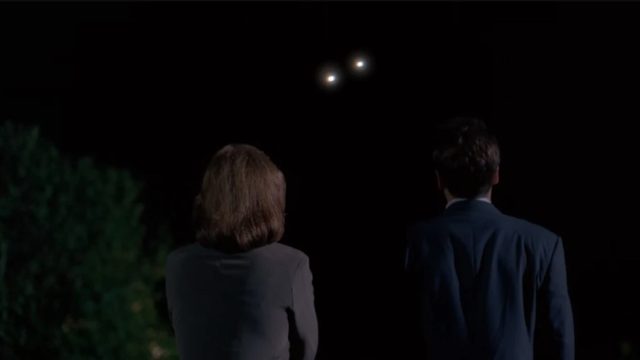The FAR Keeps On Going with:
- television rewatches
- regional cinema
- historical villains
- indie music
- evolution!
Thanks to Miller for watching the skies. The FAR will persist at its new home on Media Magpies and as always you are invited to send articles throughout the week to ploughmanplods [at] gmail, post articles below for discussion, and Have a Happy Friday!
In The London Review of Books, Patricia Lockwood details her X-Files rewatch:
Now, these episodes are a leap into something higher. Scully must disappear because Gillian Anderson is pregnant. Sometimes a punk from Grand Rapids who everyone thinks is English has just gotta have a baby at the age of 24. They hid it for a while with camera angles and increasingly square taupe blazers, but beyond a certain point the secret would be out. They discussed replacing her but saw at once that it was impossible: her upper lip, for one, and the light in her eyes. So then the show becomes about something else, something deep and dark as water, it is carried rapidly past all other unsolved mysteries to ask: what if a woman were irreplaceable?
For Film Comment, Mark Asch checks out Film Fest Knox and its support of regional cinema outside of the larger festivals:
The festival’s centerpiece, the five-film American Regional Cinema Competition, supports and spotlights, in the words of festival co-founder and artistic director Darren Hughes, “personal and ambitious work made outside of New York and Los Angeles”—the kind of cinema that can be willed into being by a resourceful and supportive community, but which is increasingly starved for oxygen at big-money domestic festivals like SXSW or Tribeca…. The top prizewinner of the Competition, Kelsey Taylor’s To Kill a Wolf, riffs on the story of Little Red Riding Hood, with the path through the woods reimagined as the interstate highways of central Oregon—open, wet, and winding roads suggestive of loneliness and danger, apt for a story that explores the more modern perils of adolescent girlhood.
Mark Asch goes long at MUBI Notebook about the portrayals of Roy Cohn on the screen:
Woods does not play Cohn as an enigma; his performance is extroverted and in constant forward motion. His Cohn is a virile motormouth even when caked in dying-man makeup: a cursing, sneering ham. Cohn is introduced rising from his deathbed and tossing aside his oxygen mask to snarl “fuck you” to a snooty doctor. Woods described Cohn’s quirks—leaning over the dinner table to eat the food off his dining companions’ plates; appearing in public with the drainage tubes from a recent facelift dangling from behind his ears—as a “feast” for an actor, and indeed, he transcends the film’s extremely rote portrait by turning it from a study of Cohn’s pathology into a self-portrait of the actor’s own congruent perversity. As an actor, a social-media user, and a culture-war figure, he has demonstrated a certain relish for combat, and his lizard-brained portrayal of one of the great American antagonists is in some sense a preview of contemporary grievance politics.
Larry Fitzmaurice tracks the declining indie rock economy and the rise in DIY marketing at Hearing Things:
“Why is this part of my job?” is a question that musicians have been asking themselves more frequently, especially when it comes to the demands of promoting themselves on social media. As an artist who began releasing music in MySpace’s heyday, Spencer Krug, 47, finds himself occasionally feeling like he’s been left behind in an ecosystem reliant on platforms he barely understands. “I probably should have paid attention to social media—but I wasn’t worried about all that stuff, because [labels] were doing it,” he admits. “Then, all of a sudden, there’s all these levers that I’ve never pulled, and I don’t really know how to pull them.”
And at his newsletter, Damon Krukowski catches a show by guitarist Habib Habib Koité 20 years after first seeing him live, and muses on what has changed and what has not:
No tradition is so flexible as an individual – this is music that has “evolved,” as Koité himself put it, alongside its composer and bandleader. “I am still in a situation of evolution in the experience of the instrument, in the experimentation of the music that I imagine on the basis of the Malian terroir. It has evolved but it hasn’t changed much,” says Koité. After all, he isn’t a pop star looking for continual surprise through novelty. His artistic project was well defined from the start, and he is pursuing it.


